This article contains spoilers for THUNDERBOLTS*
Marvel’s THUNDERBOLTS* re-introduces most of the players in its ragtag group of second-tier characters in the same scene. Yelena, the newly minted Black Widow, has found herself in an underground death trap spun by Valentina Allegra de la Fontaine, who has gathered together some other loose ends. They all briefly recap highlights from the projects we half-remember them from. Among the new recruits is Disney+ reject John Walker, who had a brief stint as the state-sponsored Captain America in the 2021 series THE FALCON AND THE WINTER SOLDIER. For the precious few people who tuned into that show when it aired, the reappearance of this man as anything but an outright villain seems pretty appalling. The other characters are wise to this, asking him, “Didn’t you kill an innocent man in broad daylight?” He shrugs and replies, “Define innocent.”
Okay, I will.
Walker was discarded by the government after publicly executing Nico, an unarmed member of a radical group known as the Flag Smashers. Walker incorrectly presumes that Nico has killed one of his fellow soldiers during a skirmish and caves his head in with Captain America’s once-iconic shield. As the vibranium guillotine is raised above his head, Nico begs for his life to no avail. His final words are, “It wasn’t me.” Sound familiar?
Walker was contrived as a social commentary on American police brutality. While THE FALCON AND THE WINTER SOLDIER was written before COVID, with a small amount of it shot before the entertainment industry went into lockdown, the vast majority was filmed in a period that began in August 2020. This was shortly after the worldwide Black Lives Matter protests caused by police officer Derek Chauvin murdering George Floyd in the street for all to see. It is impossible to imagine that this moment wasn’t front-of-mind in the execution of this storyline, even if the series doesn’t fully commit. Walker’s act of rage is not explicitly painted as racially motivated. In fact, his fallen friend is a black man and Noah Mills, the actor who plays Nico, is, at the very least, white-passing. At a moment where it could have mattered, we received a cowardly, centrist thesis statement from a series that makes several overtures about the racism that would stem from a black man taking on the mantle of Captain America.
This all leaves the backdoor perfectly cracked open for Walker to become a redeemable, even somewhat likable figure in THUNDERBOLTS*. His “define innocent” comment is never addressed in any meaningful way, although the team spends this early stretch of the film fairly disgusted with him. However, his rugged and wounded charm (he is played by Kurt Russell’s son after all) pretty quickly wins them over. As the film’s storyline about trauma and mental health unfolds, we learn that since his humiliation he’s gone through a tumultuous time with his wife and newborn. This seems to be as far as Marvel is willing to go to punish him, since they’ve found a way to retrofit him into being an antihero. Wyatt Russell seems aware of this dissonance, pondering his franchise future in an Entertainment Weekly interview:
“I don’t think John is fit to have a wife and be a father, I don’t think that’s part of what he is. And I think that what hasn’t been explored that—maybe in the future, if [Marvel doesn’t] kill me in this next movie—would be nice to explore, would be some of the things that John had to do in his past or the things that he hasn’t reconciled with. That means, usually, that receiving a Medal of Honor means it’s the worst day of your life. And that is something that I don’t think he’s ever reconciled with.”
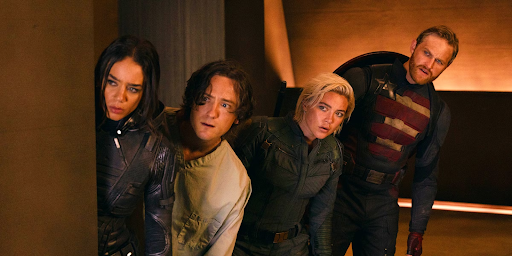
As you may have guessed, Marvel’s desire to mine current events for more socially conscious material was not entirely altruistic. For about a decade, their house style was working just fine. Since 2008, the core story of the Marvel Cinematic Universe has centered on altruistic or reformed employees of the United States Government. Granted, it has occasionally veered into the cosmic and high fantasy realms that harken back to the comic book source material, but billionaire weapons manufacturers, super soldiers, shadow agencies, and spies have always carried the day. When S.H.I.E.L.D assembled The Avengers, they were just in time to ward off a horde of aliens who spawned from above to destroy New York City, a comforting notion for a country that was rounding its ninth year of occupying Iraq and “avenging” the day where the mortals within the actual government were unable to prevent untold destruction. The American adoration spanning the Infinity Saga wasn’t the more conventional fandom that built their legacy by loving comic books. In those days, superheroes were a subculture, loved by the nerdiest and queerest among us who sought escape from reality and community around earnest love of adventure stories. Post-AVENGERS, it shifted from fandom to a national monoculture. That was a prosperous and profitable formula, but someone finally had the nerve to rip the mask off.
The 2019 superhero satire series THE BOYS is a nakedly political, left-wing work that takes on issues of nationalism, disinformation, and military violence. Its titular band of superhero killers exist in polar opposition to Vought, a conglomerate who sponsors a corporatized team of superheroes called the Seven. While they bear more of a physical resemblance to DC’s Justice League, their tightly controlled, squeaky-clean narrative under Vought is far more emblematic of the Avengers’ relationship to Disney. Chief among them is Homelander, a bigoted, jingoistic, power-hungry anti-Superman with Aryan features. The show has made it plain that he is not meant to be an ambiguous figure; he is evil and must be stopped. However, he also gets a great deal of screentime, and Antony Starr’s excellent, flashy performance is so compelling that he is often more entertaining than the Boys themselves—for a genre that has built its film fandom on destructive spectacle, this has unfortunately resulted in a failed social experiment. In an attempt to hold a mirror up to those people to show them an ugly side of the characters they love, a gigantic chunk of young men looked in that mirror and said, “Damn, I wish I looked like Homelander.”
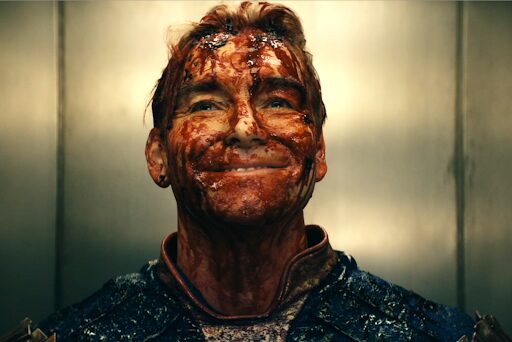
Context doesn’t matter anymore. Does the supervillain who rattles off cruel comments and fascist ideology make you feel seen? Then sure, he’s the protagonist of the show. Despite their best efforts, THE BOYS has galvanized a fandom of right-wing viewers who root for Homelander regardless of if the creators want them to. It’s something of a sick thrill for the Homelander stans; they get to see characters who act on all of their intrusive thoughts, and who, because of their natural immortality, survive and thrive despite the forces of good’s best attempts to stop them. It’s a cruel world where the cruel win. Unfortunately, since THE BOYS is an Amazon Prime production, they see any customer as a good customer. The streamer will soon enter production on VOUGHT RISING, the second spin-off of THE BOYS that will take place in the 1950s and follow the exploits of Soldier Boy and Stormfront, both confirmed and proud fascists. Yes, even the parody series gets oversaturated—it’s the circle of life. Perhaps the show will be an incisive exploration of their ideology, but it won’t matter. They’re going to say callous shit, and those evils can be regurgitated into the conservative ecosystem without context.
I’m not suggesting that the solution to this problem is to never have superhero stories with challenging or political themes. I’m a fan of all of the projects I’ve written about here, even if I do think that it’s high time that the genre reconnect with its more innocent roots. The problem is that by their very nature, superhero stories are redemptive. They’re tales about people with incredible power who still manage to make mistakes, and are then forced to survive long enough to fix them. Their abilities are so amazing and their performances so charismatic that we want to root for them, even when we know we shouldn’t. That is just a dangerous formula when crossed with characters embodying a larger-than-life version of the all-too-realistic evil we face today. It’s not just THE BOYS and THUNDERBOLTS*, every superhero universe has their own quirky, “reformed” fascist now. Over at DC, James Gunn took the character of Peacemaker, an effective grotesquerie of this trope in THE SUICIDE SQUAD, and gave him an entire spin-off series. In his titular program, we learn that he’s actually a genocidal murderer because his daddy was mean to him, and that all he really needed to come back to the light were a couple of new friends. He’s not actually a Klansman, his father just made him that way. Grow up.
Perhaps part of the fascination with this archetype comes from the inescapable fact that superhero franchises and mega-corporations are trapped in an abusive marriage of sorts with their owners. Disney will never let go of Marvel, the brand that finally turned teenage boys into Disney Adults. Warner Brothers is hoping to use DC as a ventilator while they toy around with video games and hit-or-miss efforts from auteur directors looking to play with big-boy budgets. Most insidiously, THE BOYS comes to us from Amazon, the real-life Vought, a harsh reality that you won’t see co-creator Seth Rogen poking fun at on THE STUDIO any time soon. All of these entities need to maintain their relationship with their loudest consumer, which in the case of this genre, will unfortunately always be straight white men.
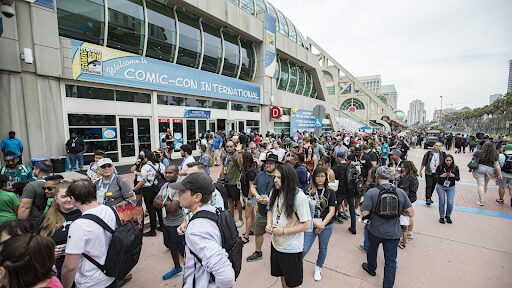
Each studio has made their own efforts to correct this reality. At the height of the genre’s popularity, there were some wild successes. BLACK PANTHER remains the most commercially viable interpretation of afrofuturism in popular culture. DC galvanized women to power WONDER WOMAN to such immense success that it smuggled an actress with a chronic lack of talent and positively rancid political views onto the A-List. Amazon has genuinely convinced its audience that THE BOYS is continuing to execute its themes successfully, despite it devolving into cheap rape gags, recycled gory set pieces, and cringe-worthy memes of Homelander as the pope.
These more progressive superhero projects were a comforting balm to the horrors of the first Trump administration, and the plan was to lean into this even more through the 2020s. We all know what happened next. In an effort to sell as many movie tickets and streaming subscriptions as possible to recover from COVID, Disney leaned into a quantity-over-quality approach that diluted the projects that were going to keep the paradigm shift turning while THE BOYS picked at the leftovers.
Marvel botched all of their most potentially subversive material by adapting them into tepid TV series that became perfect fodder for week-to-week hate from the performatively offended conservative grift machine. They fed an ecosystem of outrage instead of becoming undeniable movie events. Every week there was new discourse over what She-Hulk made fun of on her show, how Kate Bishop was upstaging Clint Barton on the Hawkeye show, and most egregiously, why they let a teenage Pakistani girl be a superhero at all. That last one particularly stings, as total unknown Iman Vellani is Marvel’s single greatest casting coup since Robert Downey Jr. Perfectly embodying the spirit of the character she portrays, Vellani’s an unapologetic fangirl who grew up with the Marvel Cinematic Universe and the sheer joy of getting to be a part of it comes across so clearly in her performance. All of that earnestness doesn’t matter when her first film appearance ended up being in THE MARVELS, an egregious botch job that sullied the success of Brie Larson’s billion-dollar CAPTAIN MARVEL and completely fumbled the mainstream introduction of both Ms. Marvel and Photon (played by Teyonah Parris), two notable women of color in the Marvel canon relegated to trivia topics.
Evidently, the backlash became too loud and box office dollars too low, and now the name of the game is winning disillusioned former fans back. To be clear, THUNDERBOLTS* is a welcome creative shift in many ways. It’s the first one of these projects to genuinely feel like it was authored by Eric Pearson and Joanna Calo and then directed by Jake Schreier. It tackles complex, compelling themes about depression and isolation in a way that will likely be deeply moving and important for the teenage audience that is the core demographic for these movies, regardless of how many times they try to “RATED R” their way out of it. It turns out their indie film marketing gimmick did have some truth to it. This is a movie that genuinely feels like it stars the actors from MIDSOMMAR, A DIFFERENT MAN, and YOU HURT MY FEELINGS. It feels like it’s lensed by the cinematographer of THE GREEN KNIGHT and scored by the composers of EVERYTHING EVERYWHERE ALL AT ONCE. It is a respectable effort. This is the first time in a long time I’ve felt any sort of hope for the long-term prospects of this series.
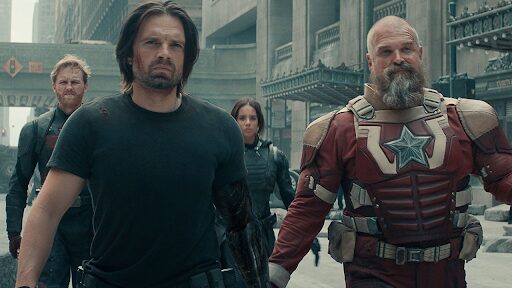
Fittingly, that hope comes with an asterisk. The revival of quality is going to be tied with a borderline pathetic yearning to earn the tepid approval of those loud white men. That means having a core team that is mostly white. It means harkening back to militaristic aesthetics instead of experimenting with Chinese folklore, gods spanning international cultures, or even the universal experience of being a teenage girl. It means more movies that are just assembly lines of cameos where actors from an era of superhero movies that should be allowed to die shamble onto screen in their ill-fitting costumes and say their own lines. Most of all, it means being forced to dig deeper into men like John Walker. To not only understand them, but make them feel like they are part of the team again.
At the end of THUNDERBOLTS*, the team overcomes their personal demons and saves New York from being sucked into a depressive void. Fittingly, they’re rebranded as the New Avengers, John Walker included. He’s shown in the post-credits scene with a funny hat on and a new uniform, ready to enter the fray of whatever the hell the Russo Brothers have in store for AVENGERS: DOOMSDAY. It’s not just that he’ll never truly have to reckon with his origins: People won’t even think that he needs to. When this issue came up in a few viral Tweets, the replies were filled with people defending Walker’s horrific murder. Most of them beat the drum of “that guy was a terrorist” and “terrorists don’t deserve rights” or some vulgar reflection of “he did nothing wrong.” In other words, John Walker won’t be enjoyed as a complex, morally grey anti-hero. He will simply have another chorus of lost young men who will shrug at you and say, “Define innocent.”



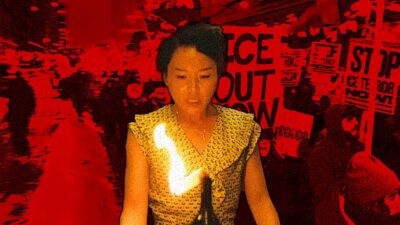
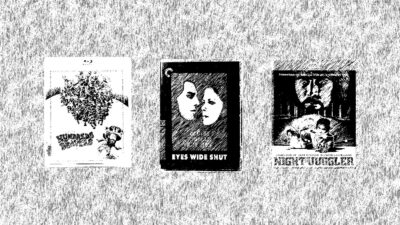

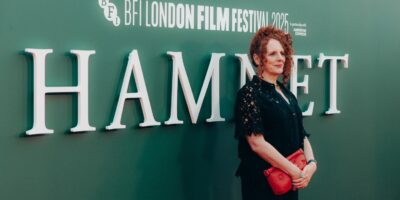

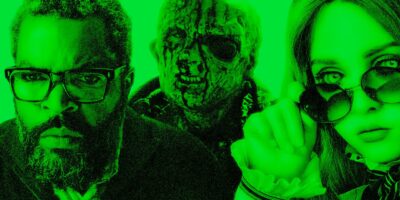

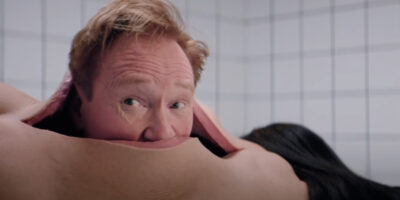





Comments